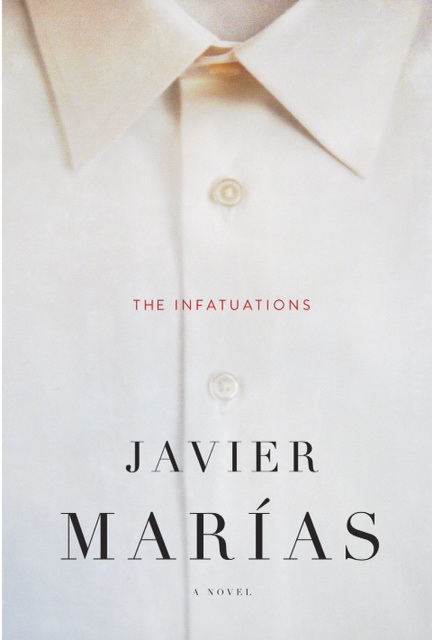In the weeks leading up to the March 13 announcement of the 2013 NBCC award winners, Critical Mass highlights the thirty finalists. Today, NBCC board member Marcela Valdes offers an appreciation of Javier María’s fiction finalist, “The Infatuations” (Knopf).
 Everyone needs something to get through the day. For some, it’s faith. For others, drugs, shopping, sex, or love. Reserved, thirty-something María Dolz relies on a man and a woman she sees almost every morning in the café where she has breakfast. Still laughing and joking like the best of friends after years of domestic union, they are, she thinks, the Perfect Couple: a vision of marital bliss. “It was the sight of them together that calmed and contented me before my working day began,” María tells us. Without them, she felt depressed. Then one afternoon the husband is stabbed to death by a homeless man. A tragic accident? Or the perfect crime?
Everyone needs something to get through the day. For some, it’s faith. For others, drugs, shopping, sex, or love. Reserved, thirty-something María Dolz relies on a man and a woman she sees almost every morning in the café where she has breakfast. Still laughing and joking like the best of friends after years of domestic union, they are, she thinks, the Perfect Couple: a vision of marital bliss. “It was the sight of them together that calmed and contented me before my working day began,” María tells us. Without them, she felt depressed. Then one afternoon the husband is stabbed to death by a homeless man. A tragic accident? Or the perfect crime?
From this scenario and three books (Balzac’s Colonel Chabert, Dumas’s The Three Musketeers, and Shakespeare’s MacBeth), the acclaimed Spanish novelist Javier Marías spins an exquisite web of confessions, lies, and sticky half-truths. That’s only the beginning. For The Infatuations is not merely a tale of love gone wrong, it’s also an evocation of modern sexual manners, a meditation on the relationship between the living and the dead, and a dazzling portrait of the master criminal as a kind of gorgeous spider: careful, patient, venomous. Not since Tom Ripley have I met such a cunning, and envious, creature.
Marías himself likes to work in delicate circles. His sentences are long, conversational, circuitous, their tension constantly redirected by his characters’s shifting doubts, evasions, and desires. More than anything, his prose reflects the brooding tenor of María’s cautious, intelligent mind — a mind agitated by her contact with a widow’s desperate grief and a womanizer’s deft manipulations. For after the Perfect Husband dies, María Dolz falls in love with his best friend: a man she meets only in his apartment, only when he calls her. Thus does one infatuation pave the way for another.
Javier Marías’s has long been acclaimed as one of Spain’s most exceptional writers: an author who builds intoxicating cocktails of philosophy and noir. His masterful murder story culminates in an scene of unforgettable ethical ambiguity. The most sinister thread his novel, however, is the silken connection that Marías traces between crime and confusion. For when the killer is finally cornered, a smokescreen of doubt is enough to enable the unrepentant to escape:
“When you don’t know what to believe,” Marías writes, “when you’re not prepared to play the amateur detective, then you get tired and dismiss the entire business, you let it go, you stop thinking and wash you hands of the truth or of the whole tangled mess—which comes to the same thing.” [319]
In other words, hidden crimes go unpunished not because criminals can’t be caught, but because of our own unwillingness to undertake the burden of sifting truth from deception, crime from camouflage. Thus our apathy abets the spiders of this world.
Eric Banks review in Bookforum
David Haglund review in Slate
Alberto Manguel review in The Guardian
Michael LaPoint review in the Los Angeles Review of Books
Javier Marías in Conversation with MFA Student Gabriel Don

